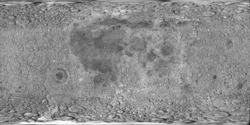Ibn Battuta (cráter)
| Ibn Battuta Cráter lunar | ||
|---|---|---|
 Cráter Ibn Battuta. Foto: Lunar Orbiter 4 | ||
| Coordenadas | 6°57′S 50°26′E / -6.95, 50.44 | |
| Diámetro | 11.51 km | |
| Profundidad | 1510 m | |
| Colongitud | 310° al amanecer | |
| Epónimo | Ibn Battuta | |
|
Localización sobre el mapa lunar | ||
Ibn Battuta es un pequeño cráter de impacto de la Luna, que se encuentra dentro del Mare Fecunditatis, un mar lunar de la parte este de la cara visible de la Luna. Se encuentra al sur del cráter Lindbergh, y al noreste del prominente cráter Goclenius.
Hacia el sur y oeste de Ibn Battuta el suelo del mar contiene varios cráteres fantasma, que consisten en cráteres que han sido cubiertos por materiales volcánicos, o material eyectado en la formación de otros cráteres. Estos sólo pueden ser vistos bajo condiciones de luz oblicua, cuando el terminador matutino o nocturno se encuentra en las cercanías.
El cráter es circular y simétrico, con un amplio interior. Las paredes interiores inclinadas tiene un albedo ligeramente superior que el material del mar, pero el interior del cráter es tan oscuro como el mar. Aparte de unos pequeños cráteres en el interior, cerca del borde oeste, no existen marcas importantes en su interior.
El cráter fue designado previamente como Goclenius A, antes de que la Unión Astronómica Internacional decidiese renombrarlo, en honor del escritor y explorador marroquí del siglo XIV Ibn Battuta.
Véase también
[editar]Referencias
[editar]- (WGPSN), IAU Working Group for Planetary System Nomenclature (13 de febrero de 2013). «Gazetteer of Planetary Nomenclature. 1:1 Million-Scale Maps of the Moon» (en inglés). UAI / USGS. Consultado el 6 de abril de 2016.
- Andersson, L. E.; Whitaker, E. A., (1982). NASA Catalogue of Lunar Nomenclature (en inglés). NASA RP-1097.
- Blue, Jennifer (25 de julio de 2007). «Gazetteer of Planetary Nomenclature» (en inglés). USGS. Consultado el 2 de enero de 2012.
- Bussey, B.; Spudis, P. (2004). The Clementine Atlas of the Moon (en inglés). Nueva York: Cambridge University Press. ISBN 0-521-81528-2.
- Cocks, Elijah E.; Cocks, Josiah C. (1995). Who's Who on the Moon: A Biographical Dictionary of Lunar Nomenclature (en inglés). Tudor Publishers. ISBN 0-936389-27-3.
- McDowell, Jonathan (15 de julio de 2007). «Lunar Nomenclature» (en inglés). Jonathan's Space Report. Consultado el 2 de enero de 2012.
- Menzel, D. H.; Minnaert, M.; Levin, B.; Dollfus, A.; Bell, B. (1971). «Report on Lunar Nomenclature by The Working Group of Commission 17 of the IAU». Space Science Reviews (en inglés) 12: 136.
- Moore, Patrick (2001). On the Moon (en inglés). Sterling Publishing Co. ISBN 0-304-35469-4.
- Price, Fred W. (1988). The Moon Observer's Handbook (en inglés). Cambridge University Press. ISBN 0521335000.
- Rükl, Antonín (1990). Atlas of the Moon (en inglés). Kalmbach Books. ISBN 0-913135-17-8.
- Webb, Rev. T. W. (1962). Celestial Objects for Common Telescopes, 6ª edición revisada (en inglés). Dover. ISBN 0-486-20917-2.
- Whitaker, Ewen A. (2003). Mapping and Naming the Moon (en inglés). Cambridge University Press. 978-0-521-54414-6.
- Wlasuk, Peter T. (2000). Observing the Moon (en inglés). Springer. ISBN 1-85233-193-3.
- «Lunar Impact Crater Database» (en inglés). Lunar and Planetary Institute (USRA). Consultado el 12 de septiembre de 2017.
Enlaces externos
[editar]- Referencia UAI del CRÁTER
- Battuta%7C0 LPI Digital Lunar Orbiter Photographic Atlas of the Moon
- Mapa LROC
- The-moon.wikispaces.com: Ibn Battuta (en inglés)
 Wikimedia Commons alberga una categoría multimedia sobre Ibn Battuta.
Wikimedia Commons alberga una categoría multimedia sobre Ibn Battuta.

